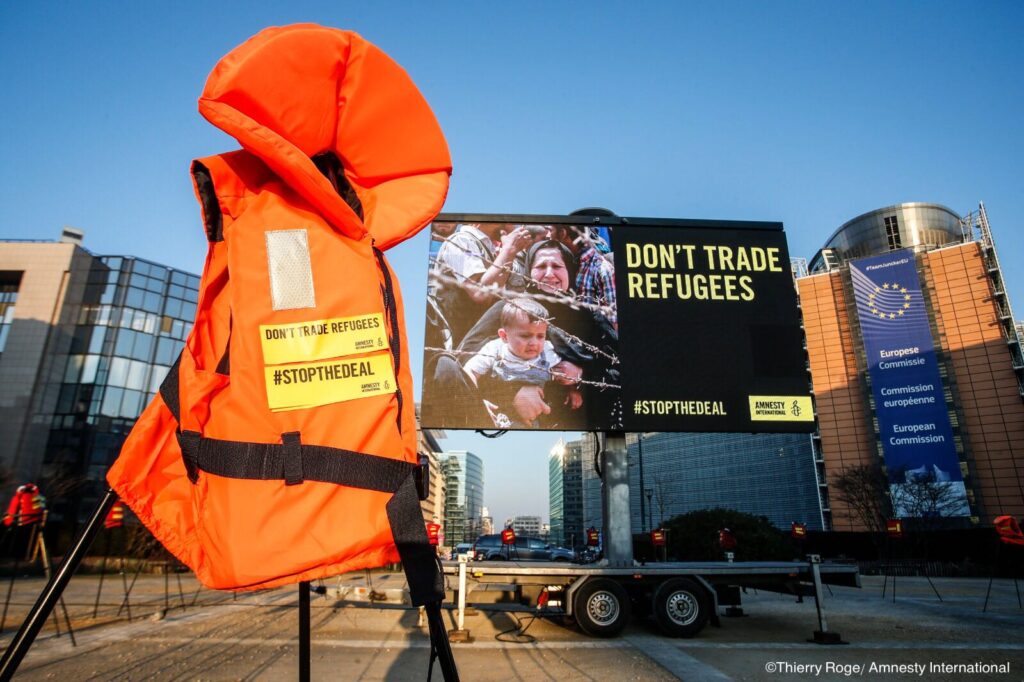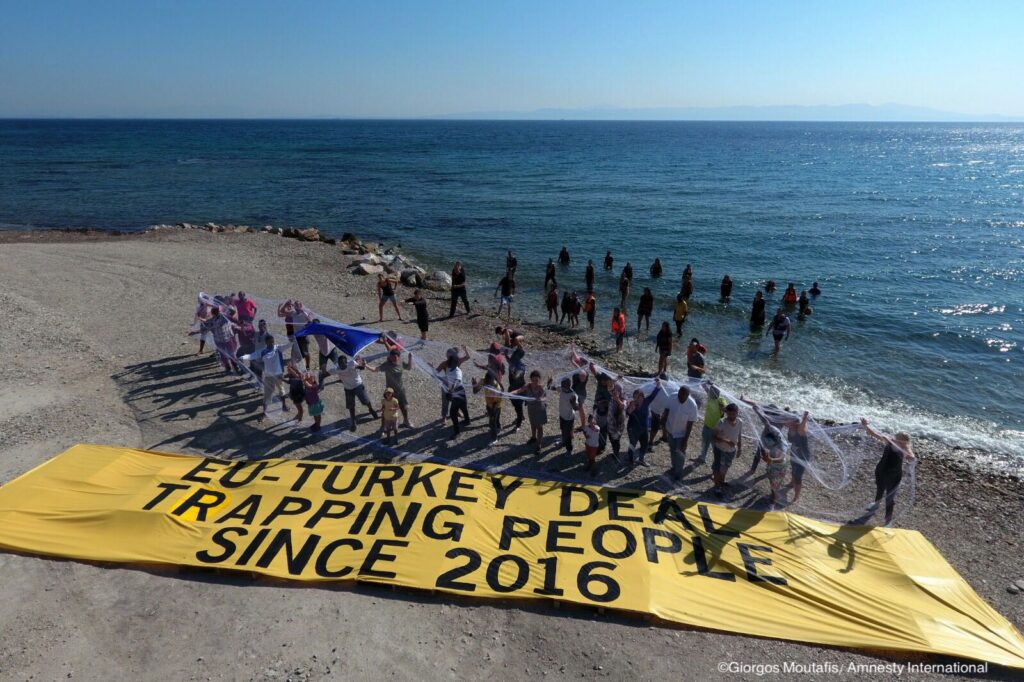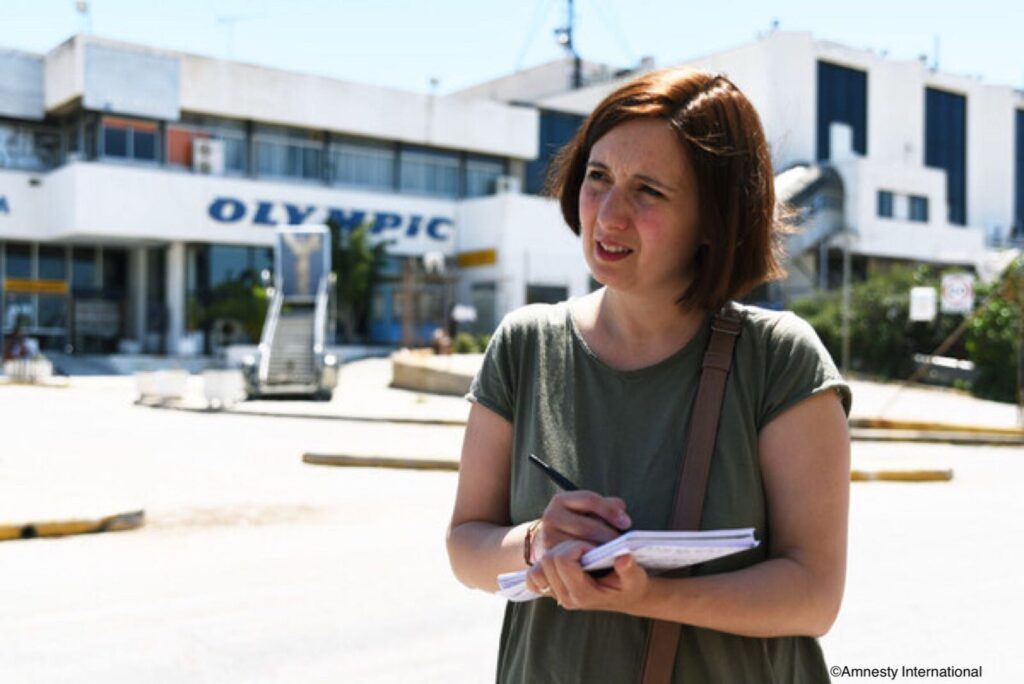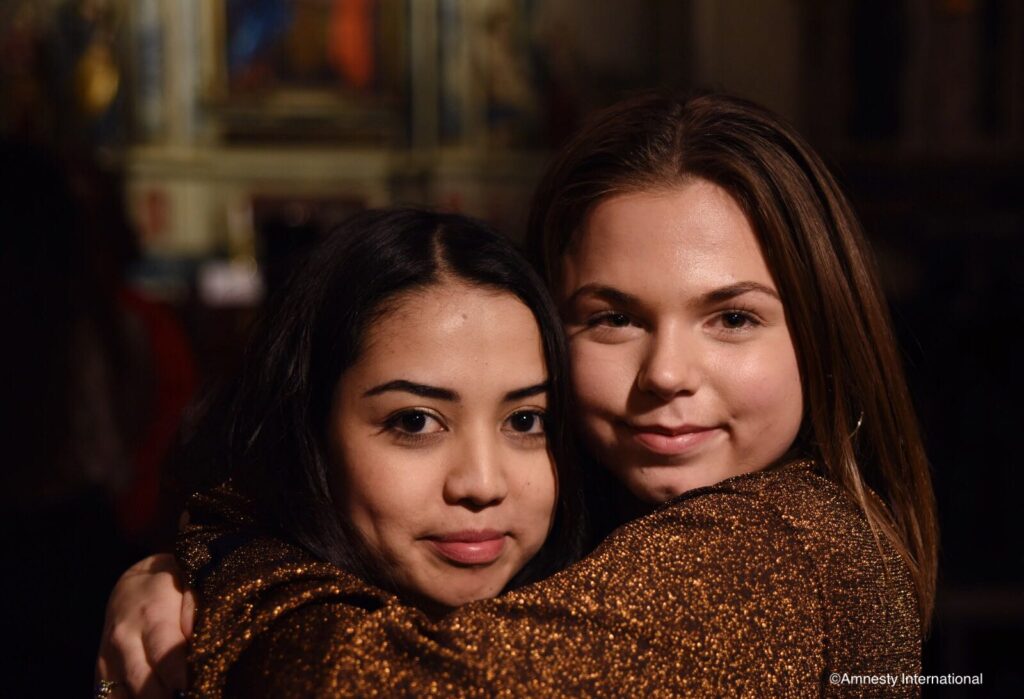Hello and welcome to MOAS…
We’re talking about raising awareness in this episode and the kinds of people and organisations spreading the message about migration.
But, what does it mean to raise awareness about migrants and refugees, how do you advocate and who do you encourage to make change happen?
Hopefully Amnesty International can explain. Maria Serrano is Senior Campaigner for Amnesty International, an organization with a record of advocating for human rights. Research, advocacy and campaigning are its key principles.
‘Basically, Amnesty’s work is based on several pillars. We do research because human rights change starts with the facts. We have human rights researchers that travel across Europe and across the world to undertaking research and collecting the facts on violations by governments. We also use technology to support our research, like satellite imagery. If we want to demonstrate that something is happening in a certain village, we use digital techniques to verify videos. We also involve people in doing this research as well, using participatory approaches.
Research is one of the key elements of the work we do, but we also do research for action which means that we use our research to advocate for change, to influence and press governments, companies and decision makers because we want them to do the right thing. Our research usually includes recommendations for governments, for corporations, for non-state-actors and militias.
Our third pillar of our work is on campaigning and action. We mobilise our supporters, we try also to mobilise public opinion, and try to offer people to be part of the change we want to see, through petitions, letters, protests. We press for action, targeting the people and institutions that can make change happen.
Usually across research, advocacy and campaigns we push for the support of individuals, the release of people from jail when they have been unfairly treated or are in prison because of their opinions. We also use human rights education to raise awareness. We also do a lot of media because we use the media as tool to press governments. Basically, we use research, advocacy and campaigns to raise awareness and develop campaigns for change.

Once a report is published how do you keep up its reach and pressure?
‘Reports are not isolated pieces. They are usually tools for broader campaign strategies so when we publish that report it’s not the end of that issue. It’s basically a tool for us to campaign and try to produce change.
What we normally do is design campaign strategies, first identifying the change we want to see and how we can contribute to that change. What is Amnesty’s role or how can Amnesty contribute to a broader change? Sometimes this involves sustained and closed-doors advocacy efforts, sometimes massive public campaigns or press releases, stances at particular moments where there is a decision that needs to be made by European leaders.
Or, as part of our campaign strategy, we can try to engage people on an emblematic case that represents the issue we want to tackle. We can, for example, ask people to support the cause through letters of solidarity but it really depends on the issue. To bring up a recent example concerning our work on Search and Rescue in the Central Mediterranean. We started working on the issue of Search and Rescue in the Central Mediterranean in 2013, and towards the end of the operation Mare Nostrum which was an Italian operation dedicated to Search and Rescue. We at that time were already warning governments that the end of the operation would lead to massive loss of life. In that context, we decided to produce our report which was the starting point of our long-term work and we for years have continued producing research and reports.
In 2015, after mass-mobilisation by our membership in April, after the two big shipwrecks in the Central Mediterranean, European leaders decided to increase the Search and Rescue vessels. So, we saw that we were making some change but unfortunately the change didn’t last. We tried to work with the strategies that allow us to adapt because the world changes. Since then, we have continued working on Search and Rescue, expanding the research and 2017 we produced a big report on European policies that are strengthening the capacity of the Libyan Coastguard to intercept people and take them back to Libya. So our research changes and adapts to the evolving circumstances. But I have other examples of how we engage on an issue.
We produce research in different years and we engage in sustained advocacy efforts. One of these examples is the EU-Turkey deal and Amnesty International was very vocal when the deal was about to be adopted. The EU-Turkey deal basically establishes that every migrant arriving irregularly on the Greek islands, has to be returned to Turkey on the basis that Turkey is considered safe for refugees. So at that moment, Amnesty had research on the asylum system in Turkey and we could actually prove that Turkey was not safe, we could also present how Turkey’s authorities were returning Afghans and Syrians to their countries of origin, basically returning people to warzones.
Of course, the EU-Turkey deal was adopted but part of our research has been useful for lawyers that are trying to stop these types of illegal returns from Greece to Turkey under the basis that Turkey is safe. So, we develop different strategies and we use different tactics depending on the change we want to see.’

What kinds of challenges do you face investigating and advocating for human rights causes?
‘Well there are several challenges. One of the main ones, when we look at for example, the European policies on migration, is that Europe is externalising and out-sourcing border control and this also means that we need to do research in countries like Libya or Sudan. Sometimes we face a real challenge when we cannot access those countries. We haven’t been able to access Libya so we rely on our reliable partners that we have on the ground and we also ask the Libyan authorities to allow us access.
There are other kinds of challenges when we do advocacy as well. There is a growing hostility from European governments that in the past, when we produced research or publish our findings, European governments felt compelled to do something. They felt ashamed or but now there is no shame, or at least facing the facts and the pressure of the human rights violations is not enough anymore. This is a real challenge when we’re advocating for human rights.
Another challenge for us is that because we work on very structural issues like migration policy, sometimes it’s really difficult for us to at least provide assistance or to make a change for all individuals. We can’t provide assistance to all individuals that we interview but normally we refer them to organisations so we try to connect them. We have a very strong commitment for ethical research and at least try to find solutions for those individuals that engage with Amnesty, although we cannot always do this directly.
Another challenge is that when we campaign or advocate for human rights, sometimes there are issues that public opinion is tired of. With the migration issue we can identify that there is a certain fatigue so we try to find innovative ways to engage people as well but we also need to re-think constantly what we do.
…We need to strike the right balance between the human rights violations and when we communicate, offering people hope and a way to change the situation…
There is no shame in governments nowadays or at least it seems that way. It’s difficult advocating solutions that are not real solutions for people and dealing with some governments that brag about very cruel policies. It’s very difficult for us to put out our facts but at the same time, offer people hope and a way to change the situation. Our work needs to strike the right balance between naming and shaming and offering people an alternative to engage and be part of the solution.’
In what ways does your research directly impact or contribute to the development of response to crises or human rights violations?
‘We work globally so when there is a crisis we put different situations in the spotlight through timely research and putting the findings out very quickly. A timely example would be when there is a UN debate or a resolution. This is something that we have done with the crisis in Myanmar with the Rohingya, with Sudan, or when there is a conflict; like Yemen or Syria.
Sometimes when a very prominent journalist has been detained, we launch appeals for their release. That’s another way in which we work and have an impact. But, in the field of migration the long-term impact is more difficult to achieve. There are however moments in which we can capitalise on the outrage. There is long term work that Amnesty is doing regarding the policies of the Trump administration. When there is the separation of families in the spotlight, Amnesty can capitalise on that because we have the long-term work and we can engage our members to change the situation.
Another example in relation to the EU-Turkey deal is that of course we haven’t seen the transformative impact that we wanted to see. The situation in the Greek islands is appalling however we have to acknowledge that because we engage on this issue on the Greek islands and the EU-Turkey deal and opposed it, we might be able to mitigate some of the damage.
The EU-Turkey deal was going to lead to mass detention and mass deportation but we are mitigating the worst effects of Europe’s migration policies. Where we assessing the impact that contributes to highlighting the political crisis on the very small scale, we have examples of camps in Greece where in particular, one of the camps we work in on a long-term basis was an old airport terminal in Athens, it was called ‘Elliniko’ camp where Afghan women were suffering violence and terrible abuses for more than a year. We are still in touch with some of the Afghan women who were transferred to better accommodation.

Sometimes our research may not produce the immediate impact that we expect but it can be used for litigation cases before the European Court of Human Rights. So, for example, in 2013, Amnesty also introduced third-party intervention to the European Court of Human Rights in one of their landmark cases, where the court ruled against Italy and banned push-backs in international waters because Italy was pushing boats back to Libya. It was a very important ruling and we are still using this ruling because it says that states have statutory obligations and they have obligations to international rule even in international waters.
We are seeing right now for example, when we published our report on Search and Rescue last week that a merchant vessel with an Italian flag pushed people back to Libya and this is illegal. So, you see how we work on litigation and how it can also be used as a tool for advocacy and campaign.’
Research and advocacy for human rights seem to have a very select audience. How then do you engage wider audiences in your work?
‘One of the things that we have learned in the past is to reach the wider public, we need wholesale communication, it cannot be everything about shaming and blaming, it cannot be about fear.
The first thing we need to do is analyse, what is your audience? The general public cannot be your audience, you need to segment that audience, you need to identify that part of the population that would be open but are uncertain about what to think about an issue. But, you can move them, you can train them to your side. But you need to use a different approach.
Through individual stories and individual cases and showing the story of change, we can engage people, we can tell them how they can be part of a better society. For that you need audience analysis.
You also need to frame your message as well. Another thing that we do is we don’t engage with people who are spreading hatred on social media. There is no way in which we can win them over. We instead try to frame the conversation so that it is positive for human beings. That is one of the key things that we are trying to do more and more.
Another element is the language. We try to use a different language when we try to engage with people. We include in our reports the hard data, the facts, but in order to engage the people, you need to adapt the language to your audience. If you are targeting a young segment of the population, you probably need to use a lot of emojis because that is how people communicate, you need to produce a lot of visuals that are compelling, and copy that is short.
So those are some of the things that we do. I want to emphasize that in particular, it’s very important that everything that we do online is accompanied by a more community-based approach because what is important as well is that the migration debate is not an isolated debate. We are seeing in different countries that some people feel scared and they feel isolated. In our activism, we are trying to build welcoming communities, communities that are open, that are diverse, where people help each-other.

We are advocating for community based solutions like community based sponsorship allowing communities to actually welcome and receive refugees.’
So, raising awareness about migration through research and report writing?… it’s more than that. Part of it is about getting the public to engage with the issues and giving them the means to be part of the solution.
And… also about holding governments to account. Amnesty’s recent reports have poured scorn on government failings to address the migrant crisis in the Mediterranean. But as Serrano points out, in order to raise awareness about continuing issues, you need to fight the fatigue through re-thinking your approach.
If you liked this Podcast don’t forget to hit like, comment and subscribe for more Podcasts from us. You can also follow us on our social media. Check out our latest updates on Facebook, Twitter, Instagram, Youtube and AudioBoom… or you can donate to help us help Rohingya refugees . From all of us here at MOAS: goodbye.
